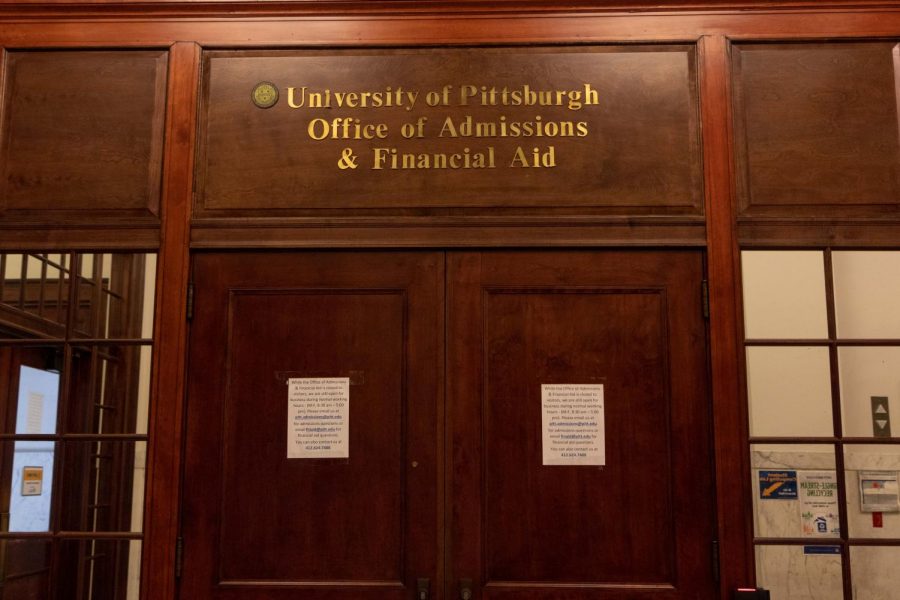Pitt goes test-optional for 2021
Caela Go | Senior Staff Photographer
Pitt’s Dietrich School of Arts and Sciences announced in July that it too would become test-optional, joining the University’s branch campuses.
September 2, 2020
As public schools closed nationwide in response to the global COVID-19 pandemic, so too did many high school students’ opportunity to take the SAT or ACT. In response, an increasing number of colleges and universities are going test-optional, requiring no SAT or ACT score.
Pitt’s Dietrich School of Arts and Sciences announced in July that it too would become test-optional, joining the University’s branch campuses. The College of Business Administration, Swanson School of Engineering and School of Computing and Information have followed suit.
Kellie Kane, the associate vice provost for enrollment and executive director of admissions, said the move to test-optional admissions is about giving every applicant a fair shot.
“What we didn’t want was for any student to miss out on the opportunity of applying for admission at the University of Pittsburgh just because they were not able to take a test,” Kane said. “There are so many testing centers around the country and the world where the tests have just been canceled. They haven’t had access to those tests and we are not about putting up barriers to students for the opportunity to become part of the Pitt family.”
Kane added that other parts of a student’s college application will take center stage this year, especially for students who choose not to submit or cannot submit an SAT or ACT score.
“Grade trends and the curriculum [that a student takes] will be very important,” Kane said. “We are going to rely very heavily on that supplemental information that they send in — the personal statement, short answer questions — perhaps letters of recommendation. Because we want to get to know these students.”
But prospective students still have doubts about this brave new world of college admissions. Anna Cappella, a senior at Pittsburgh’s Taylor Allderdice High School who plans to submit both her SAT and ACT scores, questioned how radically college admissions can truly adapt.
“Most schools claim that test-optional applicants won’t be at a disadvantage, but in a system that normally relies so heavily on test scores, I can’t imagine how,” Cappella said. “I worry about how the review process will change, especially for larger and more selective schools.”
Cappella said she hopes that deemphasizing SAT and ACT scores this admission cycle serves as a bellwether for greater progress in the college admissions process.
“A lot of people study for these tests like their future depends on it, because that’s how admissions seem to work, but I think these scores are not indicative of a student’s real worth,” Cappella said. “I hope that reviewers will take this opportunity to see how students can be assessed without standardized tests. Maybe they’ll even be happier with the results.”
Miriam Layne, a senior at nearby Pine-Richland High School who plans to submit her SAT score, said admissions officers should give less weight to SAT and ACT scores.
“I’m hoping that they may be more lenient with their admissions since there are students who will only have the opportunity to take the SAT or ACT only once,” Layne said of the few colleges using SAT and ACT scores this year.
Layne said she feels relieved by the University’s test-optional policy this admissions cycle.
“I feel much more confident in my application now that Pitt is test-optional. I was very worried before since I may only have one or two chances to take the SAT,” Layne said. “Many things are uncertain right now, so it takes away some of the stress knowing that I don’t have to worry about retaking the SAT until I get my desired score.”
Whether many colleges and universities will stay test-optional after the 2021 fall admissions cycle remains unclear. As of the 2020 fall admissions cycle, about 1,000 colleges were already test-optional, according to the National Center for Fair and Open Testing.
“My gut is telling me that the days of requiring standardized test scores are probably numbered,” Kane said. “Fingers crossed, I’m hoping that this experiment works this year. I would love to see it as a permanent part of our admissions process.”








